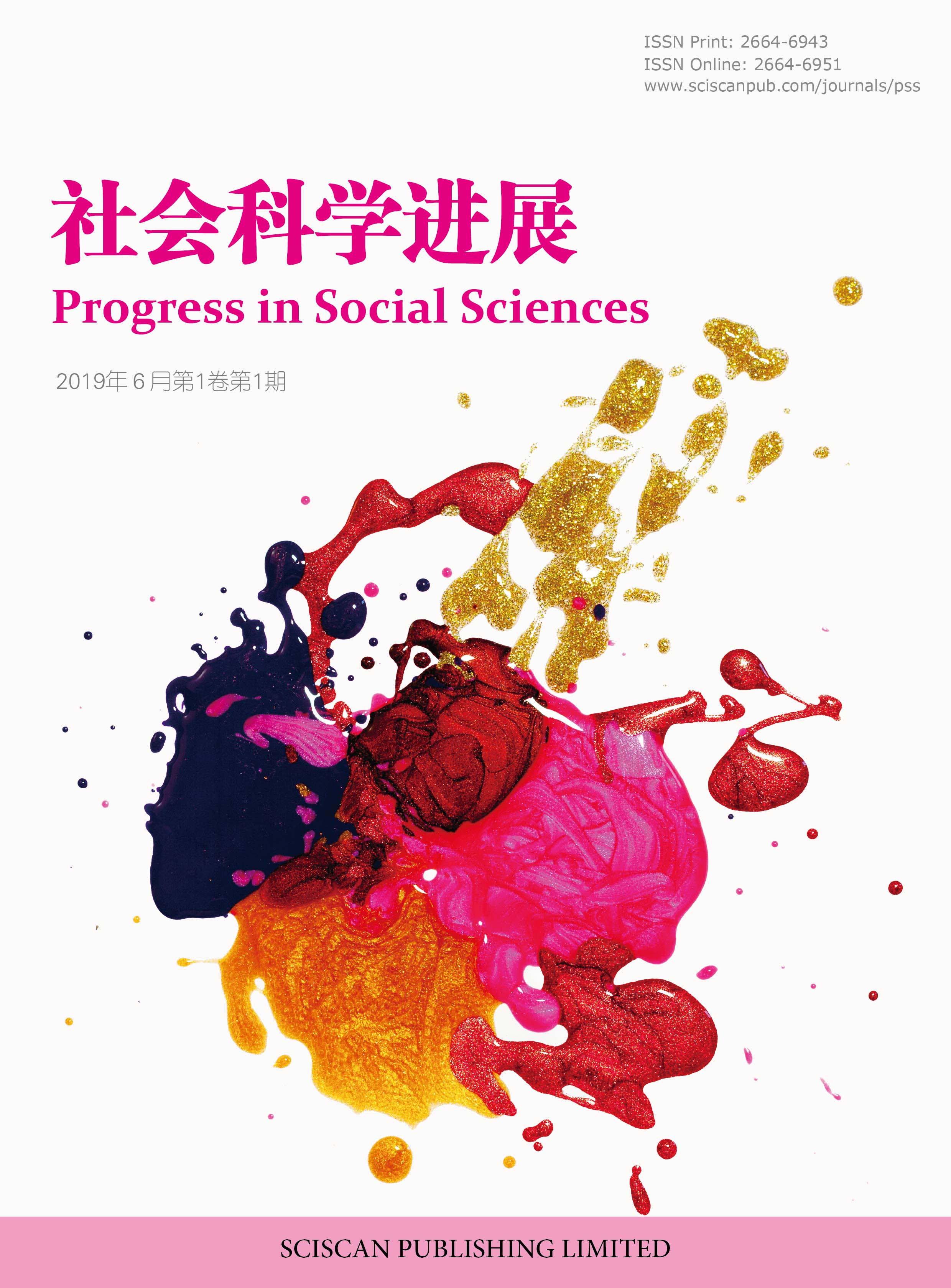Progress in Social Sciences
体教融合背景下武术非遗引入高校课程建设的实践意义、困境与路径探究
Exploring the Practical Significance, Challenges, and Pathways of Integrating Martial Arts as Intangible Cultural Heritage into University Curricula in the Context of Sports- Education Integration
- Authors: 吕志
-
Information:
浙江农林大学暨阳学院,诸暨
-
Keywords:
Integration of sports and education; Martial arts intangible cultural heritage; University curriculum; Cultural heritage transmission; Path innovation体教融合; 武术非物质文化遗产; 高校课程; 文化传承; 路径创新
- Abstract: This study employs research methods such as documentary analysis and logical reasoning to explore the practical significance and implementation pathways for integrating martial arts intangible cultural heritage (hereinafter referred to as “martial arts ICH”) into university curriculum development under the policy framework of sportseducation integration. Against the backdrop of the sports-education integration initiative, the paper proposes multiple practical implications of martial arts ICH incorporation, including: enhancing students’ cultural confidence, promoting national spirit, facilitating living inheritance of cultural genes, resolving the dilemma of “emphasizing technical skills over cultural values”, improving students’ physical and mental health, advancing physical education reform in higher institutions, enriching ideological-political elements in sports curricula, and contributing to the implementation of sports-education integration. The research systematically articulates these practical values while maintaining academic rigor through methodical analysis and standardized academic expression. Academic research indicates that the integration of intangible martial arts cultural heritage into higher education curricula faces multiple challenges, including ambiguous value orientation, insufficient attractiveness, weak curriculum implementation, inadequate resources, monotonous teaching methodologies, and unsystematic evaluation mechanisms with undefined criteria, all of which hinder the depth of sports-education integration. To address these issues, this study proposes actionable pathways through the following dimensions: strengthening cultural identity and value cultivation, enhancing faculty development and textbook construction, innovating teaching methods and pedagogical approaches, improving evaluation systems, excavating ideological-political education elements within martial arts heritage, and intensifying the integration of ideological-political components in sports-education convergence. These recommendations aim to provide theoretical support for policy formulation and educational practices while promoting the sustainable development of martial arts cultural heritage in academic settings. 本文运用文献资料法和逻辑分析法等研究方法,探究体教融合背景下武术非物质文化遗产(以下简称“武术非遗”)融入高校课程建设的实践意义与实施路径。以体教融合政策为背景,提出武术非遗在增强学生文化自信、弘扬民族精神、活态传承文化基因、破解“重技艺轻文化”困境、促进学生身心健康、推动高校体育教育改革、丰富高校体育课程思政元素,以及助力体教融合等方面的实践意义。研究发现,武术非遗引入高校课程存在价值模糊、吸引力不足、课程实施薄弱、条件欠缺、教学方法与手段单一、教学评价不系统且标准缺失等困境,导致体教融合程度不深。为此,从强化文化认同与价值观培育、加强师资队伍与教材建设、创新教学方法与手段、完善教学评价机制、深挖武术非遗的思政元素,以及强化体教融合思政元素等维度探究可行的路径,为政策制定与教育实践提供理论支持。
- DOI: https://doi.org/10.35534/pss.0705074
- Cite: 吕志.体教融合背景下武术非遗引入高校课程建设的实践意义、困境与路径探究[J].社会科学进展,2025,7(5):430-435.
近年来,“体教融合”作为国家教育战略的重要组成部分,逐步成为推动青少年全面发展和体育强国建设的核心路径。2020年8月31日,国家体育总局、教育部联合印发的《关于深化体教融合促进青少年健康发展的意见》提出:树立健康第一的教育理念,面向全体学生,开齐开足体育课,帮助学生在体育锻炼中享受乐趣、增强体质、健全人格、锤炼意志,实现文明其精神、野蛮其体魄[1]。该政策的出台为高校体育教学发展带来了新的方向,高校体育课程建设应适应新时代体育与教育需求,加快推进体育高质量发展,推动青少年全面发展和体育强国建设。首先,武术非遗作为民族宝贵的文化遗产,具有深厚的历史渊源和文化内涵[2]。将其融入高校公共体育课程教学内容,有助于增强学生身体素质、丰富体育教学内涵。其次,武术非遗项目本身具有的思政元素,非遗文化是传统优秀文化的重要组成部分。有助于增强青年人的文化自信、 提升民族信仰。高校引入武术非遗课程是体教融合背景下对高等学校体育改革道路的探索,其目的是为了更好地适应全球化人才发展的需要,更好地适应中国从小康社会、培养现代化人才的需要。
1 武术非遗在高校课程建设中的实践意义
1.1 增强学生文化自信,弘扬民族精神
武术非遗蕴含着丰富的哲学思想、道德观念和审美情趣,是中华民族文化的瑰宝[3]。叶献丹(2007)从中国武术文化的失语现象中探寻武术发展的新思考与新策略,这种立场不仅是文化认同和文化归属上的执着,更是民族立场和民族利益上的[4]坚守。通过学习武术非遗,学生能够深入了解中华优秀传统文化的内涵,增强对民族文化的认同感和自豪感,从而提升文化自信。武术中的武德教育强调“习武先习德”,注重品德修养和道德品质的培养,这有助于学生树立正确的价值观和人生观。其次,武术非遗“活态”传承特性使其在教育中具有独特优势。崔家宝(2019)指出,教育部与文化部应指导非遗传承地的教育部门,构建体育非遗教育传承体系,着重加强青少年传统文化培育,使青少年成为体育非遗活动的积极参与者,在活动过程中感知非遗文化的真正内涵,促进武术非遗的活态传承[5]。学生在学习武术的过程中,需要不断挑战自我、克服困难,这不仅能够锻炼身体,还有助于培养毅力和自信心、坚韧不拔的意志品质、团结协作的精神和勇于面对挑战的勇气,这些正是民族精神的重要体现。再者,郭玉成(2012)提出,武术国际传播的文化方略应从中国人、中华文化的角度出发,以展现中国国民形象为前提,以弘扬中华文化精神为根本,以构建中国国家文化形象为核心,提倡文化自觉的思想,体现崇尚和平的民族精神,搭建体育、文化交流的平台,展现厚德载物的胸怀,树立提升中华文化软实力的目标[6]。
武术非遗为国际文化交流提供了平台,让学生有机会向世界展示中华文化的魅力,促进文化的传播与交流。同时,通过学习武术非遗,学生能够更好地了解中国文化在世界舞台上的地位和作用,增强民族自豪感和文化自信。
1.2 活态传承文化基因,破解“重技艺轻文化”的困境
武术的招式、套路、功法等,蕴含着古人对身体机能、力量运用、空间方位的深刻认知与探索,是先辈在长期生产、生活实践中凝练的身体智慧结晶。从刚健有力的少林功夫,到刚柔并济的太极拳,再到灵动迅捷的八卦掌,每一种武术流派背后,都承载着特定的哲学思想、地域文化与民族精神。太极拳讲究以柔克刚、阴阳平衡,彰显了中国传统道家的辩证思维与对身心和谐的追求;少林功夫与佛教禅宗文化紧密相连,展现出坚毅不屈、摒除杂念、振奋精神的武僧修行境界。这些无一不是中华民族文化基因的重要体现。通过武术的活态传承,这些文化内涵得以在代代相传中保鲜、焕新。
高校作为文化传承的主阵地[7,8],通过系统的课程设置和深入的教学活动,武术非遗不仅传授技艺,还能深入挖掘和传承其背后的文化内涵。学生在学习与实践中,将深刻体会武术蕴含的哲学思想、道德观念和人文精神,实现对传统文化的全面理解与传承。这种活态传承方式,使武术非遗不再是静态的历史遗产,而成为鲜活的文化现象,得以在当代社会继续发扬光大。王林(2009)指出传统武术面临传承主体缺位、文化内涵流失等问题,提出“通过学校教育系统推广武术非遗,强化文化认同”的解决路径,强调教育在文化传承中的核心作用[3]。因此,引入武术非遗有助于破解“重技艺轻文化”的困境。
1.3 促进学生身心健康,深化高校体育教育改革
习武之人的修行理念借鉴了道教“性命双修”的教义,“命”指身体,“性”则指思想和意识,实际上就是一种思想政治意识的修炼,故习武不仅可以培养正确的健身、健康意识,还能积极地影响人的精神思想与政治信念,如《国语》中“有武德以羞为正卿”,便体现了习武之人对崇高的武德精神和家国情怀的追求。
在引入武术非遗的过程中,学生通过学习武术技艺与锻炼实践,实现了身心的健康发展。武术作为全身心参与的运动,既能提升身体协调性、灵活性和力量,同时也有助于提升学生的心理素质,如坚韧不拔的意志力和自信心。这种身心的双重锻炼,对于当代大学生的全面发展具有重要意义。此外,武术非遗的引入也为高校体育教育改革提供了新的思路和方向。传统的体育教育往往侧重于技能和体能的训练,而忽视了体育文化的传承和人文素质的培养。而武术非遗的引入,则能够将体育教育与文化传承相结合,使学生在学习体育技能的同时,也能够深入了解武术背后的文化内涵和人文精神。这种综合性的教育方式,不仅有助于提升学生的综合素质,也为高校体育教育改革注入了新的活力。
1.4 丰富高校体育课程思政元素,助力体教融合
研究表明:“武术武德文化中具有舍生忘死、精忠报国的爱国精神;刚健有为、自强不息的进取精神;厚德载物、贵和尚中的包容精神;天人合一、和谐共生的合作精神”[9]。武术中除了其所携带的民族精神中具有思政元素外,在其尚武崇德的文化氛围中也有众多思政元素,例如“点到为止”“武以德立、德为艺先”“未曾习武先习德”等。这些“德性文化”都可以作为思政元素进入课堂,来丰富课程思政提高育人的效果[10]。
将武术非遗引入高校体育课程,不仅能够丰富体育课程的内容,还能够为体育课程注入更多的思政元素。武术非遗中所蕴含的传统文化价值观和人文精神,如尊师重道、自强不息、团结协作等,都是当代大学生需要学习和传承的重要品质。这些思政元素与体育课程相结合,能够使学生在锻炼身体的同时,也接受思想的洗礼和品德的熏陶,从而实现身心的全面发展。此外,武术非遗的引入还有助于推动体教融合的发展,促进体育与教育的深度融合,为培养德智体美劳全面发展的社会主义建设者和接班人贡献力量。实现体育与教育的深度融合 阐明武术非遗课程如何体现体教融合理念,达到以体育人、以文化人的目标。
2 武术非遗引入高校课程建设的困境
2.1 课程价值定位模糊,吸引力不够
武术非遗的知名度和影响力相对较低,其传承和发展并不受到关注。例如戚家拳,目前学校很少普及有关“戚家拳”方面的知识,所以学校、教师和学生对“戚家拳”项目不够了解,如此形成恶性循环,势必不利于“戚家拳”在南通高校间的传承和发展[11]。另一方面,由于武术非遗本身具有一定的专业性和特殊性,高校在将其纳入课程体系时,课程价值的定位并不清晰,导致教师在授课过程中缺乏明确的教学目标和方向,学生对于课程的学习效果也不尽如人意。再者,武术非遗的技艺要求较高,且传承方式相对传统,与现代体育课程的教学模式存在一定的差异,这使得部分师生对其兴趣不高,缺乏足够的参与热情。在当前的体育教学中,武术的教学是以动作技术为主的,学生的学习也基本上只学习招式动作等,这种只教授动作的武术教学,让武术非遗陷入“重技艺轻文化”的困境。
2.2 课程实施体系薄弱,条件不足
师资力量匮乏,教师团队专业性不足。如:师资结构单一,缺乏对传统武术技击本源的理解、非遗传承人与高校教师协作机制缺失、师资培训体系滞后等,导致教学内容难以深入,教学效果不佳。同时,教学设施和设备也相对落后,无法满足武术非遗教学的需要。这些因素共同制约了武术非遗在高校课程中的实施和发展。张亮亮(2025)提到部分中学的体育教材却过于偏重竞技性强的田径、球类、体操等项目,而对武术内容的重视不足,这导致学生误认为学校轻视武术教育,认为学习武术缺乏实际价值,从而降低了学习武术的积极性[1]。由于武术非遗的特殊性,相关的教学资料、教材以及教学视频等并不丰富,这使得教师在教学过程中难以找到合适的教学素材,影响了教学的质量和效果。同时,对于武术非遗的研究也相对较少,缺乏深入的理论探讨和实践经验总结,这进一步限制了武术非遗在高校课程中的发展和推广。因此,加强武术非遗教学资源的建设,提高教师的专业素养和教学能力,完善教学设施和设备,是推动武术非遗在高校课程中实施和发展的关键所在。
2.3 教学方法与手段单一
教师往往过于依赖传统的教学方法,以传统的动作展示和模仿练习为主,缺乏创新和多样性,这种单一的教学手段过分注重技术技巧的学习,而忽略了学生的个性发展,从而使学生在学习中丧失积极性和创造力,也难以满足不同学生的学习需求[11]。教师坚持传统教学观念,仅重视体质与武术技能培养,忽视学生综合素质发展。 部分中学武术教师教学方法单一,偏重体质与技能教学方法(如示范、练习),缺乏全面素质培养的教学方法(如探究、游戏、比赛、观赏等),削弱了武术的教育价值[1]。教师在武术非遗的教学过程中,往往忽视了与现代科技的结合,未能充分利用多媒体、虚拟现实等先进技术来丰富教学手段,提高教学效果。这种滞后的教学方法不仅限制了学生的视野和思维方式,也使得武术非遗的教学难以跟上时代发展的步伐。因此,探索和实施多样化的教学方法和手段,注重学生的个性发展和创造力培养,是推进武术非遗课程深入发展的关键。
2.4 课程评价不系统,标准缺失
武术非遗课程评价体系的缺乏,是当前高校武术非遗教学面临的一个重要问题。由于缺乏统一、系统的评价标准,导致对武术非遗课程的教学效果难以进行客观、准确地评估,从而导致标准缺失。这不仅影响了教师的教学积极性和教学质量,也使得学生的学习效果和进步难以得到公正的评价。对于武术非遗课程的教学评价,往往只停留在对学生动作准确性和熟练度的考察上,缺乏对身体素质、心理素质、实战能力等多维度的综合评价。同时,评价标准也没有形成一套完整、科学的体系,导致评价结果的客观性和公正性受到质疑。如戚家拳课程评价方法缺乏科学性和有效性,对于课程的教学评价,往往只停留在对学员动作准确性和熟练度的考察上,缺乏对学员身体素质、心理素质、实战能力等多方面的综合评价。同时,评价标准也没有形成一套完整、科学的体系,导致评价结果的客观性和公正性受到质疑[11]。
2.5 武术非遗课程体教融合程度不深
武术非遗课程与高校体育教育体系的融合不够紧密,以及与社会体育资源的共享和互补不足。一方面,武术非遗课程往往作为独立模块存在,与高校其他体育课程之间的联系不够密切,缺乏有效的交叉融合和相互促进。这导致了武术非遗课程在高校体育课程体系中的地位不够突出,难以形成系统的教育合力。米海军(2021)指出,现在许多中学没有专业武术师资,教师只是教授浅显的武术理论知识,少有思政教育渗透[12]。传奇(2020)也发现,许多中学教师自身思想政治觉悟不高,总是以说教形式开展思政教育,亦或徒作应付,或闭口不谈[13]。王海鸥(2018)指出,当前高校武术教育只实现了套路动作和技能的传授以及健身养身功能,没有把握到实战应用、武德武礼、文化传承的武术教育精髓,既牺牲了武术文化多样性,更影响了武术思政育元素的显现和功能发挥[14]。另一方面,武术非遗课程在利用社会体育资源方面也存在不足。高校与社会体育机构、社区体育组织等之间的合作不够深入,缺乏资源共享和优势互补的有效机制。这限制了武术非遗课程在实践教学、竞赛活动、社会服务等方面的拓展和深化,影响了其教育效果的充分发挥。
3 体教融合背景下武术非遗引入高校课程建设的路径
3.1 强化文化认同与价值观培育
在体教融合背景下,将武术非遗引入高校课程建设的首要任务是强化学生对武术非遗的文化认同与价值观培育。这不仅关乎武术非遗的传承发展,更是培养文化自信、弘扬民族精神的重要途径。一方面,需通过课堂教学、实践体验、文化讲座等多元形式,深入挖掘武术非遗的文化内涵和历史价值,让学生深刻认识到武术非遗不仅是技艺的传承,更是中华民族优秀传统文化的重要组成部分。通过这些活动,激发学生对武术非遗的兴趣和热爱,从而增强他们的文化自觉和文化自信。张奇娟(2020)指出岳家拳走进大学校园,带给大学生的不仅是一门武术技能课,更是民族优秀文化的传承,他唤醒了学生埋藏在骨子里的文化自信[15]。另一方面,还应注重将武术非遗的价值观融入课程教学中。武术非遗所蕴含的爱国情怀、尊师重道、自强不息等精神品质,对于培养学生的正确价值观和人生观具有重要意义。在课程设计中,应将这些价值观与课程内容紧密结合,通过生动的教学案例和实践活动,引导学生树立正确的世界观、人生观和价值观,为他们的全面发展奠定坚实的基础。
3.2 加强师资队伍、教材建设
教师作为教学活动的主导者,他们的专业素养直接影响课程教学质量。因此,加强师资队伍建设是武术非遗进高校课程的关键环节。高校应加强师资队伍建设,一方面,高校应引进具备丰富武术非遗知识和实践经验的教师,充实教学力量。另一方面,需要加强对现有教师的培训,提升其对武术非遗的理解和教学能力。焦红波指出,围绕传统武术进校园的系列调查活动发现:不同年龄段的学生对传统武术的接受能力不一样,而以往通用武术教材均由大学编写,水平较高,主要以培养专业运动员为目标,并不适合中小学生,所以在实践过程中普遍接受度较低,很难推动传统武术在校园内的传承落地。基于此,他们结合一线体育老师意见以及不同年龄段学生特性,编排了适应不同年龄、非专业学生容易接受的教材,一方面既有文化和教育价值,另一方面还有专业性,能激发学生兴趣。经过一年多编排,形成了能够落地的教材[16]。教材作为教学活动的重要载体,其质量直接影响学习效果。因此,应组织专家学者,结合武术非遗特点与高校教学需求,编写高质量的教材,为武术非遗课程的教学提供有力支撑。
3.3 创新教学方法与手段,优化课程体系
应该改变传统的教学方法和手段,进一步优化课程体系。可以运用现代教育技术利用多媒体、虚拟现实、在线教学平台等手段[17],丰富教学资源,拓展教学空间,让学生在沉浸式的环境中学习武术非遗,提高他们的学习兴趣和参与度。同时,采用多样化的教学方法 结合讲授法、示范法、练习法、情境教学法等,并借鉴其他学科的优秀教学方法,如项目式学习、翻转课堂等,引导学生在实践中学习,培养他们的自主学习能力和团队协作能力。在课程体系方面,应该注重课程的系统性和连贯性,避免内容的重复和遗漏,同时也要根据学生的实际情况和需求,灵活调整课程内容和难度,确保学生能够全面、深入地了解武术非遗的精髓。此外,还应加强课程之间的交叉融合,构建多元化的课程体系,既注重武术技艺的传承,又强调文化、历史、哲学等多方面的教育,以全面提升学生的综合素质。
3.4 完善教学评价机制
建立科学的评价指标体系 从学生的学习态度、技能掌握、文化理解等多维度设置评价指标。采用多元化的评价方式 综合运用过程性评价、终结性评价、自我评价、互评等方式,全面客观地评价教学效果。 需要在身体素质与技术水平测试基础上,围绕“立德树人”根本任务,重视考查大学生政治认同、家国情怀、道德修养、法治意识、文化修养等主要思想政治方面情况,协调各类教学评价方法,打造日常与专门相结合、技道并重的多元化评价机制[18]。在日常教学中,教师要注重形成性评价,利用“启发式”教学方式,通过口头提问开展随堂评价,审视学生对武术非遗内容的认知以及思想政治形态,譬如以习武目的、人格追求、行事风格为内容形成问题,引导每一位同学发言,分析学生回答中所表露的思想意识形态,尤其关注学生“学前”和“学后”的思想改变,设置相关评分机制,做好评价记录,并融入最终成绩。同时,教师还可以通过观察学生日常学习行为,以学习积极性、专注力、求知欲等态度表现,以及同学间相互帮助、对动作精益求精等行为表现为评价标准,设置日常表现分,并融入最终成绩[19]。
3.5 深挖武术非遗的思政元素,强化体教融合的协同合作
技艺是武术非遗内容的直观表现,技艺教学是“由技入道”“技道并建”的实施起点,也是学生体悟武术非遗精神内涵最主要、最基本的途径,教师应合理选取某一武术非遗技艺为入手点,可以是武术基础动作、单势、动作组合,也可以是技术规范、对练准则等内容,清晰建构技艺与武德、拳理、美学、传统理念、地域文化等内涵要素的逻辑通路,在教学中带领学生挖掘、感悟武术非遗技艺内蕴的政治认同、家国情怀、道德修养、法治意识、文化修养等思政元素,高质量开展思政教育[20]。教师应深入挖掘武术非遗中所蕴含的思政元素,如忠诚、勇敢、坚韧不拔等品质,将其融入教学实践中。通过数字化将武术非遗背后的历史故事和文化内涵,引导大学生领悟其中的思政价值,进一步激发他们的爱国情感和民族自豪感。同时,教师应积极与体育、思政等相关部门合作,共同推进武术非遗与思政教育的深度融合,实现体教融合的协同合作。与体育部门合作 与体育局、武术协会等合作,共同开展武术非遗赛事、培训等活动,为学生提供实践平台。与文化产业结合 推动武术非遗与文化创意产业结合,开发武术非遗文化产品,促进其传承与发展。加强校园文化建设 将武术非遗纳入校园文化活动体系,如举办武术非遗文化节、社团活动等,营造浓厚的文化氛围。
4 结语
在体教融合背景下,将武术非遗引入高校课程建设,不仅是传承与创新传统文化的时代命题,更是落实“健康中国”战略、深化素质教育改革的重要实践。本研究通过深入分析武术非遗融入高校课程的实践意义,揭示了当前引入高校课程过程中面临的困境,并针对性地提出实施路径。本研究紧紧围绕武术非遗引入高校课程建设路径的探究,旨在呼吁更多学者与教育工作者关注该领域,推动武术非遗与高校课程的深度融合,为中华优秀传统文化的传承与发展贡献力量。
参考文献
[1] 张亮亮.体教融合背景下中学武术教育的价值、困境与路径研究[J].学校体育,2025,33(1):192-194,251.
[2] 孟涛.新时代我国传统武术非遗项目发展现存问题与对策研究[J].北京体育大学学报,2024,47(6):50-59.
[3] 王林,虞定海.传统武术非物质文化遗产传承的困境与对策[J].上海体育学院学报,2009,33(4):85-88.
[4] 叶献丹.中国武术的“文化失语”与“文化认同”的思考——以体育全球化为背景[J].武汉体育学院学报,2007(3):13-17.
[5] 陈小蓉,崔家宝,周爱光.我国体育非物质文化遗产活态传承影响因素及路径选择[J].体育科学,2019,39(4):12-22.
[6] 郭玉成,刘韬光.文化强国视域下武术国际传播方略[J].成都体育学院学报,2012,38(4):7-11,21.
[7] 陈晓宇,张克荣.文化育人视域下高校传承地方文化资源路径探析[J].河北能源职业技术学院学报,2022,22(1):29-32.
[8] 童国军.非遗视角下传统武术保护与体育校本课程特色建设的互动研究[J].武术研究,2019,4(7):79-82.
[9] 徐锋.中国传统武德文化融入高校思政教育的价值意蕴与实现路径[J].体育文化导刊,2019(12):13-19.
[10] 赵歆,龙行年,彭小伟,等.高校武术课程思政的育人内涵、面临问题与推进策略[J].武汉体育学院学报,2022,56(8).
[11] 顾玉梅.体育非遗项目融入高职院校体育课程存在的问题及对策研究 ——以“戚家拳”为例[D].渤海:渤海大学,2024.
[12] 米海军.浅谈中小学武术教学现状与对策[J].甘肃教育研究,2021(4):65-68.
[13] 冷传奇.“立德树人”理念下学校武术教育课程思政实践路径探究[J].青少年体育,2020(11):28-29.
[14] 王海鸥.核心素养导向下的中小学武术教育的思考[J].西安体育学院学报,2018,35(4):460-464.
[15] 张奇娟.非遗项目“岳家拳”走进高校武术课的探索——以嘉兴学院为例[J].浙江体育科学,2020,42(6):53-56.
[16] 林松柏.身体实践:武术类非遗校园传承的路径研究[J].民俗研究,2024(5):61-73.
[17] 王维成.数字化时代武术非遗传承与保护的路径探析[J].当代体育科技,2022,12(33):145-148,170.
[18] 成黎明.新时代大学生思想道德素质评价指标体系的理论建构与实证分析[J].大学教育科学,2023(1):83-94.
[19] 周瀚轩.武术非遗融入中学体育思政教育研究[D].山东:山东师范大学,2022.
[20] 赵歆,龙行年,彭小伟.高校武术课程思政的育人内涵、面临问题与推进策略[J].武汉体育学院学报,2022,56(8).
















